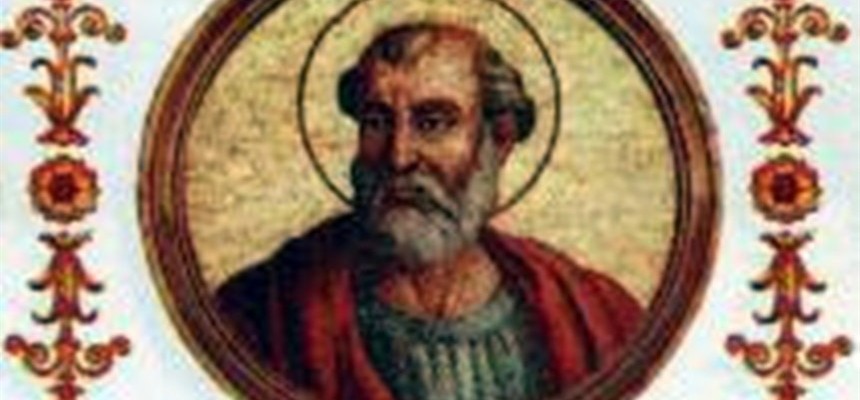Pope Fabian was martyred by the emperor Decius on January 20, 250. The persecuction of Christians was extreme for the next fourteen months, and the Chair of Peter remained vacant. About March, 251, the persecution lessened, probably because Decius was away, trying to fight his new rivals, the Goths. It was finally safe enough to assemble sixteen bishops in Rome and a representative number of laymen to elect a new bishop. Cornelius, a Roman priest, was elected against his will. Since all of Cornelius’ letters were written in the colloquial Latin, rather than in Greek of the upper classes, we can assume that he was a commoner with a basic education.
Given the statistics we have at the time, there were 46 priests, seven deacons, seven sub-deacons, fifty acolytes and fifteen hundred widows and people in distress. The Church fed fifteen hundred every day. Given these numbers, there may have been up to 50,000 Christians living in Rome at the time.
Coming out of the persecutions, the Christian population was split in two: those who were willing to forgive those who escaped persecution and death by sacrificing to the Roman gods and those who were not. Novatian, another Roman priest, was of the opinion that these people should not be forgiven until the Last Judgement. Cornelius lead the group who felt, with penance, these people should be welcomed back into communion with the Church. Novatian, not happy with the election, made himself another bishop, or antipope, and thereby split the city and its environs into schism.
Cornelius wrote to St. Cyprian of North Africa and secured the votes of one hundred African bishops, and, within months, secured more votes via St. Dionysius, in the East. In October of 251, a synod in Rome voted to restore communion to those in question, with appropriate penance. It also confirmed the election of Cornelius and excommunicated Novatian and his followers. We know there were at least sixty in attendance. Eusebius, in his History of the Church, wrote about the letters Cornelius sent to Bishop Fabius of Antioch explaining the irregular election and behavior of Novatian.
In June, 251, Decius was killed in the battle of Abrillus and his soldiers proclaimed Trebonianus Gallus the new emperor. A year later, the persecutions began again. Cornelius was exiled to Civita Vecchia. Cornelius’ people did not defect this time. A letter from Cornelius, while in exile, mentions an exorcist, for the first time in Church history. Since then, canon law has ruled an exorcist be available.
Cornelius died the following June, possibly from the hardships rather than a murder. Eventually, he was buried in the catacombs of the Cornelli family. His epitaph is in Latin: Cornelius, Martyr. Relics can be found in Kornelimunster, Germany.
This pope is patron saint of earache sufferers, epileptics, fevers, twitching, cattle and domestic animals.
Saint Cornelius, pray for us.
Given the statistics we have at the time, there were 46 priests, seven deacons, seven sub-deacons, fifty acolytes and fifteen hundred widows and people in distress. The Church fed fifteen hundred every day. Given these numbers, there may have been up to 50,000 Christians living in Rome at the time.
Coming out of the persecutions, the Christian population was split in two: those who were willing to forgive those who escaped persecution and death by sacrificing to the Roman gods and those who were not. Novatian, another Roman priest, was of the opinion that these people should not be forgiven until the Last Judgement. Cornelius lead the group who felt, with penance, these people should be welcomed back into communion with the Church. Novatian, not happy with the election, made himself another bishop, or antipope, and thereby split the city and its environs into schism.
Cornelius wrote to St. Cyprian of North Africa and secured the votes of one hundred African bishops, and, within months, secured more votes via St. Dionysius, in the East. In October of 251, a synod in Rome voted to restore communion to those in question, with appropriate penance. It also confirmed the election of Cornelius and excommunicated Novatian and his followers. We know there were at least sixty in attendance. Eusebius, in his History of the Church, wrote about the letters Cornelius sent to Bishop Fabius of Antioch explaining the irregular election and behavior of Novatian.
In June, 251, Decius was killed in the battle of Abrillus and his soldiers proclaimed Trebonianus Gallus the new emperor. A year later, the persecutions began again. Cornelius was exiled to Civita Vecchia. Cornelius’ people did not defect this time. A letter from Cornelius, while in exile, mentions an exorcist, for the first time in Church history. Since then, canon law has ruled an exorcist be available.
Cornelius died the following June, possibly from the hardships rather than a murder. Eventually, he was buried in the catacombs of the Cornelli family. His epitaph is in Latin: Cornelius, Martyr. Relics can be found in Kornelimunster, Germany.
This pope is patron saint of earache sufferers, epileptics, fevers, twitching, cattle and domestic animals.
Saint Cornelius, pray for us.


Recent Comments